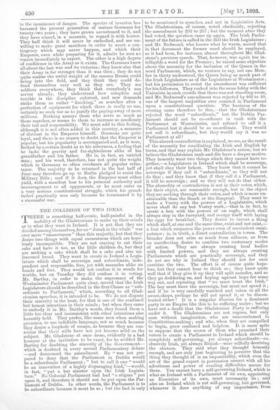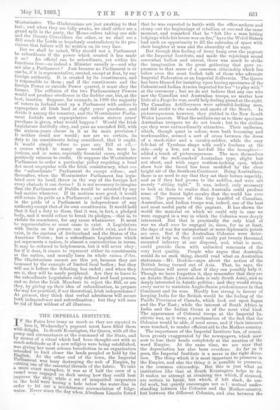THE COLLISION OF TWO IDEAS. T HERE is something half-comic, half-painful
in the inability of the Gladstonians to make up their minds as to what they want in Ireland. It is not that they are divided among themselves, for no " Jonah in the whale ' was ever more " unimermous " than this majority, but that they desire two things with equal earnestness which are hope- lessly incompatible. They are not craving to eat their cake and have it too, as the little children do, but they are seeking a cake which shall be a cake and also un- leavened bread. They want to create in Ireland a Legis- lature which shall be sovereign and subordinate, inde- pendent and responsible, free, yet with manacles alike on hands and feet. They would not confess it in words for worlds, but on Tuesday they did confess it in voting. Mr. Bartley, in order to make the supremacy of the Westminster Parliament quite clear, moved that the Irish Legislature should be described in the first Clause as " sub- ordinate to Parliament," which, according to all Glad- stonian speeches, it is intended to be. We do not dispute their sincerity in the least, for that is one of the confused but honest intentions in their minds ; but when they came to embody it in Mr. Bartley's words, they found them a little too clear and inconsistent with other intentions also honestly held. They prefer, like some men when making promises, to use indefinite language, not so much because they desire a loophole of escape, as because they are con- scious that their wills have not yet become solid on the subject. Mr. Gladstone at once arose, evidently in a bad humour at the invitation to be exact, for he scolded Mr. Bartley for doubting the sincerity of the Government— which is doubted in every second Parliamentary debate —and denounced the amendment. He " was not pre- pared to deny that the Parliament in Dublin would be a subordinate Parliament ; " but to call it one " would be an innovation of a highly disparaging kind,"—would, in fact, " put a bar sinister upon the Irish Legisla- ture." No Colonial Parliament had had " a stigma ' put upon it, and therefore it should not be put upon the Par- liament of Dublin. In other words, the Parliament is to be subordinate because it must be so ; but the fact is only to be mentioned in speeches, and not in Legislative Acts. The Gladstonians, of course, voted obediently, rejecting the amendment by 292 to 257; but the moment after they had voted, the question came up again. The Irish Parlia- ment of the future is called in the Bill the Irish Legislature ; and Mr. Redmond, who knows what he wants, moved that in that document the former word should be employed, as it had been, for instance, almost throughout Mr. Glad- stone's previous speech. That, however, was again too in- telligible a word for the Premier ; he raised some objection about the necessity for the inclusion of the Queen in the word Parliament, which, we venture to say, not one Mem- ber in thirty understood, the Queen being as much part of the Irish Legislature as of the Legislature at Westminster ; but his permission to resist the amendment was sufficient for his followers. They rushed into the same lobby with the Unionists in such crowds that there was not standing-room, and Mr. Redmond's amendment was rejected by 466 to 40, one of the largest majorities ever counted in Parliament upon a constitutional question. The business of the evening came therefore to this,—that the Gladstonians rejected the word. "subordinate," lest the Dublin Par- liament should not be co-ordinate in rank with the Parliament at Westminster, and refused to call it a Parliament lest it should be so co-ordinate. They would not call it subordinate, but they would say it was no Parliament at all!
This absurd contradiction is explained, we see, as the result of the necessity for conciliating the Irish and English by turns, and that may explain Mr. Gladstone's action; but we believe the Gladstonian rank-and-file have a deeper motive. They honestly want two things which they cannot have to- gether,—a Legislature in Ireland which shall be sovereign, yet shall obey their behest. They know that it cannot be sovereign if they call it " subordinate," so they will not do that ; and they know that if they call it a Parliament, it will be sovereign ; and so they will not do that either. The absurdity or contradiction is not in their votes, which, for their object, are reasonable enough, but in the object they are seeking through their votes, and which is more un- attainable than the Snark or the Sangreal. They want to make a Vestry with the powers of a Legislature, which never shall do any but Vestry work,—that is, in fact, to create a hen with the powers of an eagle, which shall always stop in the barnyard, and occupy itself with laying the eggs for breakfast. They desire to invent a thing which shall, at one and the same time, exist and not exist,— a feat which surpasses the power even of omniscient omni- potence; is, in truth, a direct contradiction in terms. The blunder does not arise so much from silliness, as from an unreflecting desire to combine two customary modes of action. They are always creating local bodies with limited powers, and they are always creating Parliaments which are practically sovereign, and they do not see why in Ireland they should not for once combine the two. The effort is of course quite hope- less, but they cannot bear to think so ; they know quite well that if they give it up they will split asunder, and so they go doddering on, and hoping against hope for some way out, and repeating that " we must trust the Irish." The boy must have the sovereign, but must not spend it ; and if he is very carefully watched and taken to all the sweet-shops, perhaps he will not spend it, or be discon- tented either ! It is a singular illusion for a dominant party in an Empire like this to be suffering under ; but we have not a doubt that the Gladstonian Party is suffering under it. The Gladstonians are not rogues, but only men without imagination, who are unaccustomed to Constitution-making ; and who, when they are compelled to begin, grow confused and helpless. It is mere spite to suppose that the scores of them who promised their voters to create a Parliament in Ireland which should be completely self-governing, yet always subordinate—ex- elusively Irish, yet always British—were wilfully deceiving the electors. They said what they thought honestly enough, and are only just beginning to perceive that the thing they thought of is an impossibility, which even the art of the grand expert in persuasion cannot with all his adroitness and power of evading difficulties secure for them. You cannot have a self-governing Ireland, which is what an Ireland with a Parliament of its own, appointing an Executive of its own, must necessarily be ; and also an Ireland which is not self-governing, but governed, whenever it does anything of any importance, from Westminster. The Gladstonians are just awaking to that fact ; and when they are fully awake, we shall either see a grand split in the party, the Home-rulers taking one side and the County Councillors the other, or we shall see a Bill reach the Lords so hopelessly contradictory in its pro- visions that failure will be written on its very face. But we shall be asked, Why should not a Parliament be subordinate if the power which created it has made it so? An official can be subordinate, yet within his functions free—as indeed a Minister usually is—and why not also a Parliament ? Just because no Parliament is or can be, if it is representative, created, except at first, by any foreign authority. It is created by its constituents, and is responsible to them ; and if the constituents and the foreign Power or outside Power quarrel, it must obey the former. The collision of the two Parliamentary Powers would not produce obedience in the feebler one, but, at the best, inaction. Suppose, for example, in 1898 the majority of voters in Ireland send up a Parliament with orders to expropriate all Irish land at eight years' purchase, and divide it among the tenantry, and the Westminster Parlia- ment forbids such expropriation unless sixteen years' purchase is given, what would happen ? Would the Irish Legislature dutifully obey, and pass an amended Bill, with the sixteen-years clause in it as its main provision ? It neither could nor would ; nor are we certain, its duty to its constituents being considered, that it ought. It would simply refuse to pass any Bill at all,— a course which in many cases would be most in- jurious, and in some, especially financial cases, might be positively ruinous to credit. Or suppose the Westminster Parliament to order a particular policy requiring a local Act most unpopular with the Irish constituency, what can the " subordinate " Parliament do except refuse ; and thereafter, when the Westminster Parliament has legis- lated over its head, throw in the way of the foreign Act every obstacle it can devise ? It is not necessary to imagine that the Parliament of Dublin would be actuated by any bad motive whatever. If its motives were good, it would still retain its pride as a Parliament ; and the first element in the pride of a Parliament is independence of any authority except that of its own constituents. It would hold that it had a duty to them, that it was, in fact, a pledged body, and it would refuse to break its pledges,—that is, to violate its conscience, for any cause whatsoever. It must be representative or must cease to exist. A Legislature with -limits on its powers can no doubt exist, and does exist, in the cantons of Switzerland and the States of the American Union ; but a subordinate Legislature which yet represents a nation, is almost a contradiction in terms. It may be reduced to helplessness, but it will never obey ; for if it does, it ceases to represent either its constituents or the nation, and morally loses its whole raison d'gtre. The Gladstonians cannot see this yet, because they are bemused by the example of limited local bodies ; but they will see it before the debating has ended ; and when they see it, they will be sorely perplexed. Are they to leave to the subordinate Legislature only defined and local powers, and so drive the Irish Members to reject the Bill, or are they, by giving up their idea of subordination, to prepare the way for practical, if not theoretical, Irish independence ? At present, they think that verbal adroitness will secure both independence and subordination ; but they will soon be rid of that wildest of all illusions.



































 Previous page
Previous page